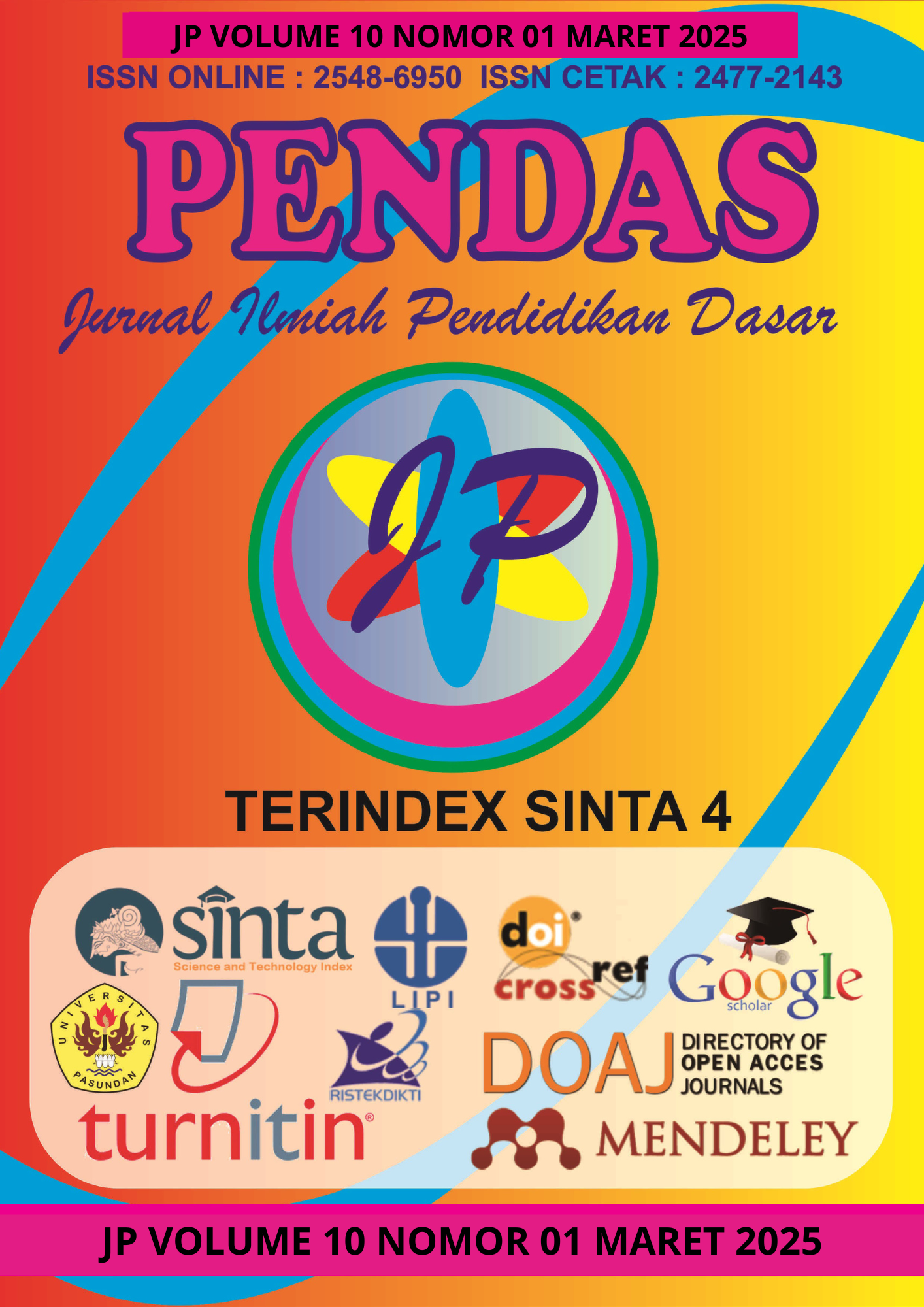PENERAPAN GAME BASED LEARNING UNTUK MENINGKATKAN HASIL BELAJAR PADA MATA PELAJARAN IPAS SISWA KELAS V SD NEGERI 091254 BATU ONOM
DOI:
https://doi.org/10.23969/jp.v10i01.23789Keywords:
Method, Game-Based, Learning, Learning outcamesAbstract
Based on initial observations, the science and science learning process at SD Negeri 091254 Batu Onom, Siantar District, Simalungun Regency for the 2024/2025 academic year is not yet optimal. This is proven by the grade V odd semester report cards with an average of 65.5. This classroom action research was carried out by applying the Game Based Learning model. The Game Based Learning Model is a learning model with a play approach. The play method in learning functions to increase enjoyment and eliminate student boredom while studying so that it can increase students' enthusiasm for learning. This research aims to find out whether this method can improve students' cognitive aspects. This classroom action research consisted of 2 cycles with the research subjects being 21 students in class V of SD Negeri 091254 Batu Onom, Siantar District, Siamlungun Regency. Data about cognitive aspects was obtained from student test results. Indicators of success in the cognitive aspect must achieve a minimum of 65% completeness from at least 85% of the number of students taking the test. The research results showed an increase in students' cognitive aspects from cycles I to II. The cognitive aspect of cycle I during the pre test was 42,81% to 57,14% during the post test and cycle II during the post test was 14,28% to 85,71% during the post test. This learning model can be successful because the question disc game system requires students to answer questions randomly, so that students are responsible for their own answers and knowledge. From the research results, it can be concluded that the application of the Game Based Learning model on the subject of the water cycle and natural events can improve the cognitive aspects of class V students at SD Negeri 091254 Batu Onom, Siantar District, Simalungun Regency.
Downloads
References
Kirom, A. (2017). Peran Guru Dan Peserta Didik Dalam Proses Pembelajaran Berbasis Multikultural
Yusuf Aditya, D. (2016). Pengaruh Penerapan Metode Pembelajaran Resitasi terhadap Hasil Belajar Matematika Siswa. SAP (Susunan Artikel Pendidikan), 1(2), 165–174. https://doi.org/10.30998/sap.v1i2.1023
Rahmawati, S., & Rahmah, E. N. (2023). Keterampilan Mengelola Kelas Guru Sejarah Kebudayaan Islam Dalam Meningkatkan Minat Belajar Siswa.
Lumbantobing, W. L., Silvester, S., & Dimmera, B. G. (2022). Penerapan Media Permainan Ular Tangga Untuk Meningkatkan Minat Dan Hasil Belajar Peserta Didik Sekolah Dasar
Khaerunnisa, K., Latri, L., & Lestari, R. (2022). Penerapan Metode Games Based Learning untuk Meningkatkan Minat Belajar pada Siswa Kelas IV.
Widiana, W. (2022). Game Based Learning dan Dampaknya terhadap Peningkatan Minat Belajar dan Pemahaman Konsep Siswa dalam Pembelajaran Sains di Sekolah Dasar.
Ulfa, E. M., Nuri, L. N., Sari, A. F. P., Baryroh, F., Ridlo, Z. R., & Wahyuni, S. (2022). Implementasi Game Based Learning untuk Meningkatkan Kemampuan Literasi dan Numerasi Siswa Sekolah Dasar. Jurnal Basicedu, 6(6), 9344–9355. https://doi.org/10.31004/basicedu.v6i6.
Mulyasa. 2003. Kurikulum Berbasis Kompetensi, Konsep, Karakteristik dan Implementasi. Bandung: PT Remaja Rosda Karya.
Marentek, J. C., Mongdong, R. J., & Tumurang, H. J. (2022). PENERAPAN MODEL PEMBELAJARAN THINK PAIR AND SHARE UNTUK MENINGKATKAN HASIL BELAJAR IPS DI KELAS IV SD INPRES KANEYAN. EDU PRIMARY JOURNAL, 3(3), 37-46.
Downloads
Published
Issue
Section
License
Copyright (c) 2025 Pendas : Jurnal Ilmiah Pendidikan Dasar

This work is licensed under a Creative Commons Attribution 4.0 International License.



















